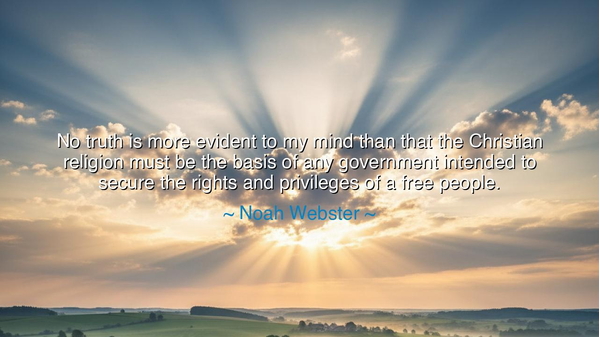
No truth is more evident to my mind than that the Christian
No truth is more evident to my mind than that the Christian religion must be the basis of any government intended to secure the rights and privileges of a free people.






The words of Noah Webster — “No truth is more evident to my mind than that the Christian religion must be the basis of any government intended to secure the rights and privileges of a free people.” — are the voice of a man who looked upon the dawn of a new nation and saw that liberty without virtue is a ship without anchor. These words, radiant with conviction, come not from a preacher’s pulpit but from the heart of one who helped shape the mind of America. Webster, the father of American education and language, believed that the strength of a republic lay not merely in its laws, but in the moral character of its citizens. To him, faith was not the enemy of freedom — it was its guardian.
The origin of this quote lies in the young years of the American Republic, a time when the Founders sought to build a government that would stand not upon tyranny or bloodline, but upon principle and virtue. Webster, steeped in both learning and faith, understood that the idea of freedom was not born of chaos, but of conscience. He had witnessed the Revolution and the founding of the Constitution. He saw that liberty was a dangerous gift — one that could only be safely wielded by a people bound by moral discipline. Thus he declared that the Christian religion — with its teachings of justice, humility, mercy, and love — was not merely a private belief, but a foundation for public order.
In Webster’s mind, religion and government were not to merge in tyranny, but to coexist in harmony — one forming the soul, the other the structure. The Christian faith, as he saw it, provided the moral compass necessary for self-government. For if men are to be free, they must first learn to govern themselves, and such governance cannot be sustained by force or law alone. Only when guided by conscience — by the eternal moral law of right and wrong — can liberty endure. As he and many of his contemporaries believed, a people that cast aside virtue would soon trade freedom for license, and in their unrestrained passions destroy the very rights they once cherished.
History bears witness to the truth of his words. Consider the fate of the French Revolution, which began in the same century as America’s. It too sought liberty, equality, and fraternity — yet unlike the American founders, the revolutionaries rejected religion as a relic of oppression. They tore down the churches, mocked the divine, and exalted reason as god. But reason unmoored from morality became cruelty. The guillotine became their altar, and their new freedom descended into terror. France, for all her enlightenment, found that without a moral foundation, liberty turned swiftly to chaos. In this, the difference between the two revolutions shines like a warning: America’s freedom was tempered by faith; France’s freedom was consumed by the fire of its own pride.
Webster’s words are not a demand for theocracy, but a call to moral unity — a reminder that political freedom without inner virtue is fragile and fleeting. A government that seeks to protect the rights and privileges of a free people must rest upon the shared understanding of what is good, just, and true. If truth becomes relative, if justice becomes a tool of convenience, the pillars of freedom crumble. The Christian principles of honesty, compassion, respect for law, and love of neighbor form not merely a creed, but the invisible scaffolding of a free society.
This truth extends beyond nations and into the heart of every person. For government, like a mirror, reflects the character of its people. If citizens lose their moral compass, laws will grow corrupt, leaders will grow deceitful, and liberty will decay from within. To sustain freedom, therefore, each individual must become a keeper of virtue — faithful in small things, steadfast in truth, humble in power, and merciful in judgment. The freedom of a nation begins in the righteousness of its citizens.
Let the lesson be heard across generations: Faith is not the chain of freedom, but its shield. It teaches restraint to the strong and dignity to the weak. It binds communities in trust, reminding men that they are answerable not only to their fellow citizens, but to the eternal Judge of all hearts. Therefore, nurture faith, cultivate virtue, and hold fast to the moral truths that sustain liberty.
For if a nation forgets that freedom is a sacred trust, not a selfish prize, it will lose both its spirit and its soul. But if it remembers — if it grounds its laws in justice, its education in wisdom, and its heart in faith — it shall stand as a beacon through the ages. Thus, Noah Webster’s words endure not as relics of a bygone age, but as a living command: that the liberty of the body must always be rooted in the righteousness of the soul.






AAdministratorAdministrator
Welcome, honored guests. Please leave a comment, we will respond soon